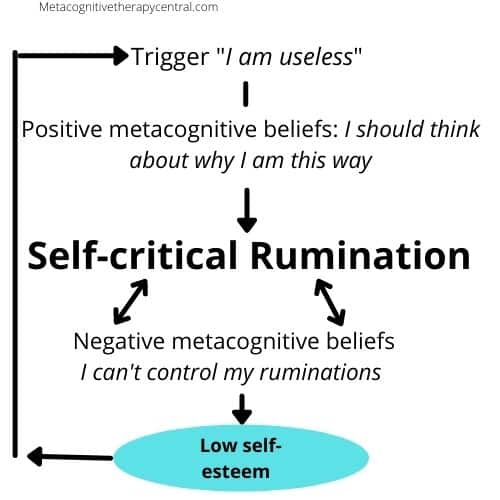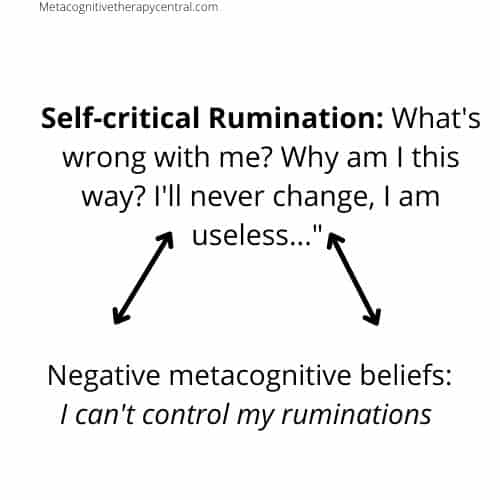
Theories of self-esteem suggest that self-esteem functions as a warning system triggered by signs of rejection and exclusion from social groups. According to such theories, self-esteem serves an important social function (making sure that we maintain important social relationships) (2). But, preoccupation with self-esteem can sometimes blow out of proportion and cause immense suffering.
MCT can explain how low self-esteem is maintained through self-critical rumination. Self-critical rumination is a voluntary and resource-consuming strategy activated in the presence of negative thoughts. It is possible to learn to reduce self-critical rumination with MCT.
According to Metacognitive therapy (MCT), metacognitive beliefs (beliefs about engaging with negative thoughts) are the most important factors in causing and maintaining low self-esteem (3).
Self-critical rumination is the process of focusing our attention on self-critical thoughts and past failures instead of attempting to improve things.
How to recover from low self-esteem
Stop ruminating about self-critical thoughts
Understand that rumination is not a helpful way to learn from personal mistakes
Learn that rumination can be brought under control
How is low self-esteem maintained according to MCT
Self-critical thoughts, when combined with positive metacognitive beliefs (beliefs about the usefulness of engaging with negative thoughts), lead to rumination in the first place.

Instead of solving specific problems, people with low self-esteem ruminate about their thoughts instead. Rumination is a repetitive thinking style that is not the same thing as problem-solving. Instead, rumination can lead to more negative thoughts and a lower mood.
People who ruminate about their self-critical thought end up keeping themselves trapped in a bad cycle of low self-esteem.
In the process of self-critical rumination, metacognitive beliefs about the advantages of ruminating are activated. These metacognitive beliefs convey that rumination is a helpful way to learn from past mistakes and can lead to ways to prevent future mistakes:
If I understand what really happened, I can find solutions
Beating myself up will help me not make mistakes in the future
I deserve to punish myself
However, rumination prolongs negative thoughts and feelings (4), which activates negative metacognitive beliefs that rumination can’t be stopped:
Rumination is uncontrollable
I can’t stop thinking about past mistakes once I have started
I can’t focus on anything else when I think about my past mistakes and failures
Thinking that you can no longer stop ruminating will continue the cycle (5).


Here is an example of how someone starts ruminating about self-critical thoughts:
Initial triggering thought: “That was stupid; I shouldn’t have said that.”
Metacognitive belief: I should analyze why I am this way
Rumination: (and treating self-critical thoughts as facts): “Why do I keep messing up? What is wrong with me? What are they all gonna think? No one is gonna like me anymore. Why can’t I just be normal? I am a total failure.”
Feelings: Sad, hopeless
Metacognitive belief: I can’t control how I think. I can’t focus on anything else. I am going to lose my mind if this continues.
Continuing rumination: “I am never going to feel better. Will this ever end? How am I gonna cope? I can’t go on like this. My family will get tired of me and don’t want to be close to me anymore. I should get it together. I am such a failure…”
Feelings/consequences: Sad, hopeless, depressed, insecure, low self-esteem, and more negative thoughts.
As is shown here, self-critical thoughts don’t lead to low self-esteem by themselves. It is rather the belief that we cannot detach ourselves from those negative thoughts and therefore continue to ruminate about them.
Self-critical thoughts don’t lead to low self-esteem by themselves. It is the negative self-evaluation process that follows the thought that maintains low self-esteem
Research has found that people who engage in self-criticism are less likely to solve problems and are more likely to feel helpless or hopeless in stressful situations (4).

Is self-esteem important, and should we improve it?
Sense of belonging and fitting in
According to conventional theories of self-esteem, the function of self-esteem is to help regulate our behavior so that we can feel a sense of purpose and connection with other people (2).
Correlation with mental disorders
The Diagnostic and Statistical Manual of Mental Health Disorders (8) associates low self-esteem, negative self-evaluation, and self-criticism with 21 different disorders: depression, anorexia nervosa (eating disorder), bulimia nervosa (eating disorder), sexual dysfunction, and avoidant personality disorder, which are good reasons to improve low self-esteem.
Exaggerated preoccupation with self-esteem
Research suggests that preoccupation with self-esteem can get out of control. Some people become very preoccupied with analyzing and improving their self-esteem, even when the consequences can cause harm (2) (for example, causing anxiety and depression, or exploiting others to be viewed a certain way).
According to Metacognitive therapy, extended thinking styles like worry and rumination cause mental disorders (like anxiety and depression).
Self-critical rumination is also an extended thinking style that causes low self-esteem. Therefore, to avoid mental health consequences, reducing self-critical rumination may be more important than focusing on directly improving self-esteem.
Self-esteem is not always an accurate measure of success in life and social relationships (because human beings are programmed to focus more on negative aspects of themselves), and self-esteem is not important for setting and accomplishing goals (2).

Self-esteem is not always an accurate measure of success
How is low self-esteem usually treated?
Many therapeutic interventions to improve self-esteem challenge the content of people’s negative thoughts and alter their self-defeating behaviors (10).
For example, in cognitive-behavioral therapies, negative thoughts are challenged through questioning the evidence of the content of one’s self-critical thoughts: “What is the evidence that you are a failure? What is the counter-evidence? What would you tell a friend who had similar thoughts?“
How Metacognitive therapy improves self-esteem
Metacognitive therapy can help improve low self-esteem through:
1) Challenging and changing metacognitive beliefs (it is not helpful to ruminate about negative thoughts, and it is possible to stop self-critical rumination)
2) Detached mindfulness – to allow the presence of self-critical thoughts but not analyze them
In Metacognitive therapy, clients learn that it is possible to learn from past mistakes without engaging in self-critical rumination.
It is, therefore, important to understand the negative consequences of self-critical rumination, which motivate people to learn to reduce it. They also learn that self-critical thoughts are brief and pass if left alone.
Having a do-nothing attitude toward self-critical thoughts stops self-critical rumination and potentially reduces the frequency of these thoughts in the future (due to a process called self-regulation).
This can lead to improved self-esteem and better social- and problem-solving abilities.

References
- Photo by Giulia Bertelli
- Leary, M. R., & Baumeister, R. F. (2000). The nature and function of self-esteem: Sociometer theory. In M. P. Zanna (Ed.), Advances in experimental social psychology, Vol. 32, pp. 1–62). Academic Press. https://doi.org/10.1016/S0065-2601(00)80003-9
- Hagen R, Havnen A, Hjemdal O, Kennair LEO, Ryum T and Solem S (2020) Protective and Vulnerability Factors in Self-Esteem: The Role of Metacognitions, Brooding, and Resilience. Front. Psychol. 11:1447. doi: 10.3389/fpsyg.2020.01447
- Nolen-Hoeksema, S. (2004). The response styles theory. In C. Papageorgiou & A. Wells (Eds.), Depressive rumination: Nature, theory, and treatment (pp. 107–124). New York: Wiley.
- Kolubinski DC, Nikčević AV, Lawrence JA, Spada MM. The metacognitions about self-critical rumination questionnaire. J Affect Disord. 2017 Oct 1;220:129-138. doi: 10.1016/j.jad.2017.06.002. Epub 2017 Jun 7. PMID: 28618314.
- Photo by Sir Manuel
- Photo by Brandy Kennedy
- American Psychiatric Association. (2013). Diagnostic and statistical manual of mental disorders (5th ed.). https://doi.org/10.1176/appi.books.9780890425596
- Photo by Jonas Kakaroto
- Fennell, M. (2016). Overcoming low self-esteem: A self-help guide using cognitive behavioural techniques. Hachette UK.



